How to Balance Work and CFA Preparation Effectively
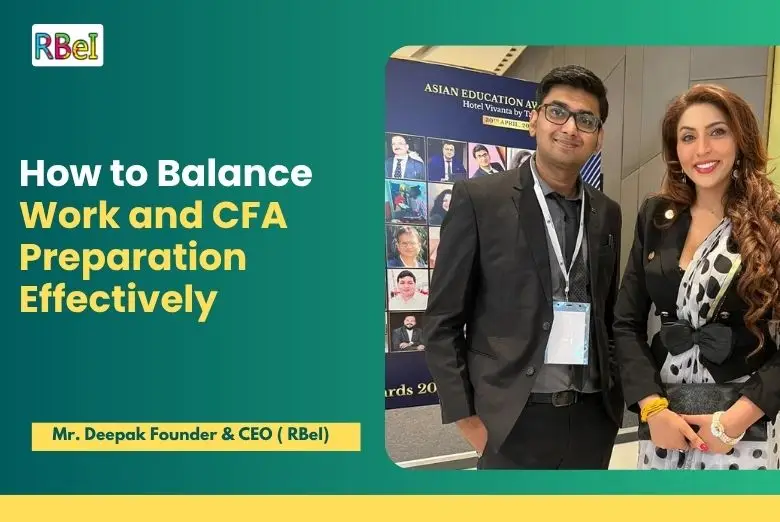
Balancing a demanding job while preparing for the CFA exam can seem like an overwhelming challenge. Many finance professionals struggle to find the right balance between work commitments and CFA study schedules. However, learning how to balance work and CFA preparation effectively is not only possible but can also enhance both your professional and academic growth. In this blog, we will provide actionable strategies, time management tips, and motivational advice to help you achieve success in the CFA exams without compromising your work performance. By following these guidelines, you can balance work and CFA preparation effectively, stay consistent, and maintain your mental well-being throughout the journey. Understanding these challenges is the first step to finding ways to balance work and CFA preparation effectively. Effective Time Management Strategies for CFA Candidates Time management is the backbone of balancing work and CFA studies. Here’s how you can structure your schedule effectively: 1. Create a Realistic Study Plan Start by mapping out your available hours each week. Identify pockets of time for study, such as early mornings, lunch breaks, or evenings. Prioritize the CFA curriculum based on exam weightings, and create weekly study goals. A structured study plan ensures that you cover all topics systematically without last-minute cramming. Tip: Use a calendar or study app to track daily progress. Allocating even 1-2 focused hours daily can accumulate into 15-20 productive study hours per week. 2. Apply the 80/20 Rule Focus on the areas that give you the maximum return. For example, identify high-weighted topics such as Equity, Fixed Income, or Ethics, and dedicate more time to mastering these. By prioritizing critical sections, you can balance work and CFA preparation effectively without spreading yourself too thin. 3. Break Study Sessions into Chunks Rather than long, exhausting sessions after work, try shorter, focused study blocks of 25-50 minutes with 5- 10 minute breaks. This technique, known as the Pomodoro Method, enhances retention and prevents burnout. Example Schedule: 6:00 AM – 6:50 AM: Study Quantitative Methods 6:50 AM – 7:00 AM: Short break 7:00 AM – 7:50 AM: Study Economics Evening: Review flashcards for 30 minutes Breaking the workload into manageable chunks allows you to balance work and CFA preparation effectively. 4. Optimize Your Commute If you commute via public transport, leverage this time for listening to CFA audio summaries or reviewing notes. Even 30 minutes daily can accumulate to several hours of valuable study over a month. 5. Use Weekend Study Wisely Weekends are golden opportunities for extended study sessions. Plan at least 3-4 hours of focused study on one or two topics. Remember to take breaks to avoid burnout. Consistent weekend study can significantly ease your weekday load, helping you balance work and CFA preparation effectively. Incorporating Work-Life Balance Techniques Balancing work and CFA preparation is not just about managing study time; it’s also about maintaining your energy and motivation. 1. Prioritize Health Adequate sleep, balanced diet, and regular exercise boost concentration and energy levels. Even 20-30 minutes of physical activity can rejuvenate your mind and enhance productivity. 2. Avoid Multitasking Switching between work and study reduces efficiency. Dedicate focused time for CFA preparation and avoid distractions like social media or unnecessary emails. This approach helps maintain clarity and focus, which is essential to balance work and CFA preparation effectively. 3. Set Boundaries at Work Communicate your study commitments to your manager if possible. Adjust minor responsibilities during peak study periods. Many employers appreciate proactive time management and may support flexible arrangements. 4. Use Mindfulness and Stress Management Techniques Incorporate meditation, journaling, or breathing exercises to reduce stress. Mindfulness enhances focus and allows you to tackle CFA preparation without feeling overwhelmed. Smart Study Techniques for CFA Exam Success Effective study methods are key to balancing work and CFA preparation. Here’s how you can maximize learning efficiency: 1. Focus on Active Learning Instead of passive reading, engage in active learning through: Solving practice questions Creating flashcards Summarizing topics in your own words Active learning boosts retention and helps you cover more ground efficiently. 2. Use Mock Exams Strategically Attempt mock exams under timed conditions. This practice familiarizes you with exam patterns and improves time management skills. Review errors carefully to identify weak areas, ensuring you balance work and CFA preparation effectively. 3. Leverage Technology Use CFA prep apps, video lectures, and online forums to study efficiently. Digital resources allow you to study anytime, anywhere, which is essential for working professionals. Motivation and Mindset: Staying on Track Your mindset plays a crucial role in balancing work and CFA preparation. 1. Set Clear Goals Define your long-term and short-term goals. Visualize passing the CFA exam and the career benefits it brings. Goal clarity fuels consistent effort. 2. Celebrate Small Wins Every completed topic or mock exam deserves recognition. Small celebrations boost morale and sustain motivation throughout the preparation journey. 3. Build a Support Network Join CFA study groups or online communities. Discussing concepts with peers provides new perspectives and keeps you accountable. Sample Weekly Schedule to Balance Work and CFA Preparation Day Morning (6–8 AM) Evening (7–9 PM) Weekend (3–4 hrs/day) Monday Ethics & Quantitative Review Notes Practice Questions Tuesday Economics Solve Mock Questions Deep Dive into Weak Topics Wednesday Financial Reporting Flashcards & Summaries Review Mock Exam Thursday Equity Practice Questions Study New Topic Friday Fixed Income Review & Revise Practice & Recap Saturday Mock Exam Practice Relax & Review Extended Mock Exam Sunday Ethics & Weak Areas Revise Key Formulas Recap & Planning This structured approach ensures a balance between professional obligations and CFA preparation. Also Read: Best CFA Study Tips & Coaching by Deepak Goyal Sir Final Thoughts: Achieving CFA Success While Working Balancing work and CFA preparation effectively requires discipline, planning, and a positive mindset. By creating a realistic study plan, leveraging short study sessions, prioritizing health, and using smart study techniques, you can confidently navigate both your professional and academic goals. Remember, consistency is key. Focused, strategic effort over several months is far more effective than last-minute cramming. By following these
How to Pick Winning Stocks in a Volatile Market

Volatility, stock picking, winners, risk management, and strategy – if you want to know how to pick winning stocks in a volatile market, you need more than guesswork. In this blog we will explore strategies, tools, psychology, and real tips so that you can make informed decisions even when the markets swing wildly. Even though volatility often intimidates many investors, knowing how to pick winning stocks in a volatile market can turn opportunity from chaos. Key phrases like how to pick winning stocks in a volatile market and volatility will appear repeatedly, in natural ways, so that you grasp the concept deeply. Let’s dive in step by step. Understanding Volatility and Why It Matters Before we talk about how to pick winning stocks in a volatile market, we must clearly define volatility, what it means for investors, and how it shapes opportunities and risks. What is Volatility? Volatility refers to the degree of variation in a stock’s price over time — in short, how wildly it moves up and down. When prices jump up and down sharply, we call the stock (or the market) volatile. Technical measures of volatility include: Standard deviation of returns Bollinger Bands: when bands widen, volatility is high; narrow bands suggest low volatility Average True Range (ATR): measures how far price typically moves over a period Beta: how a stock’s movement compares to the market index (for example, the S&P 500). A beta > 1 means more volatile than market; beta < 1 means less volatile. Volatility is not inherently bad. In fact, it is what allows gains (and losses). But volatility magnifies both opportunities and risk. Thus, knowing how to pick winning stocks in a volatile market is less about predicting certainty and more about managing risk, identifying high-probability setups, and staying disciplined. Volatility vs. Risk It’s useful to separate volatility from risk. Volatility is simply fluctuation. Risk is the chance of permanent loss or being wrong in your judgment. Sometimes, high volatility can be an opportunity; sometimes it can destroy capital if unmanaged. Core Principles for Picking Winning Stocks in Volatile Markets To succeed at how to pick winning stocks in a volatile market, you need to anchor yourself in core principles. These are the foundation you carry with you regardless of how crazy the markets get. 1. Start with Strong Fundamentals Even in volatile conditions, quality tends to persist. A business with strong fundamentals (healthy revenue growth, sustainable profits, good management, manageable debt) is more likely to survive turbulence. Earnings consistency: look for companies that maintain profitability, even if growth slows. Balance sheet strength: low debt, ample cash, good liquidity. Competitive moat: unique advantages over rivals (brand, patent, scale, network effects). Management credibility and track record. Volatility can cause even great stocks to drop, but quality gives you a better chance of recovery. 2. Use Technicals to Time Entry and Exit Technicals become more important when volatility is high. Here are key tools: Breakout from consolidation: stocks that trade in a range and then break out can rally sharply in a volatile environment. Trend confirmation: follow the prevailing trend (up or down). Avoid betting against the trend unless strong signals reverse it. Resistance/support zones: identify price levels where supply or demand tends to act. Volume confirmation: a breakout or reversal with higher volume is more reliable. Volatility indicators: ATR, Bollinger Band expansions, volatility spikes. Moving averages: e.g., 50-day, 200-day used to gauge trend direction or dynamic support/resistance. 3. Diversification and Position Sizing (Don’t Put All Eggs in One Basket) One of the biggest mistakes people make during volatile markets is going “all in” on a single idea. Instead: Limit any one stock to a small percentage of total capital (e.g. 2–5%). Diversify across sectors or business models. Use stop-loss orders or mental stops to cut losses if a trade goes wrong. Consider hedges (e.g. options, inverse ETFs, or protective puts) if your strategy allows. 4. Risk Management Is Non-Negotiable When volatility is high, mistakes magnify. Thus: Define your maximum loss per trade before entering. Use trailing stops to lock in profits if the trend continues. Avoid emotional adjustments mid-trade; follow the plan. Reassess your portfolio frequently and rebalance where needed. 5. Be Contrarian When Appropriate, But Carefully In volatile markets, crowd reactions are often exaggerated, creating mispricings: A contrarian investor might buy when others are panicking and sell when others are euphoric. But being contrarian doesn’t mean being reckless. Confirm your thesis with data, fundamentals, and conviction. 6. Use a Blend of Short-Term and Medium-Term Approaches Depending on your time horizon: For shorter-term trades (days to weeks), volatility gives you more moves to ride. For longer-term investments, use dips to accumulate quality stocks or average your entry (e.g. dollar-cost averaging). 7. Maintain Emotional Discipline and Stay Informed Avoid panic selling. Markets often overreact downward first, then recover. Maintain a checklist or system to guard against emotional decisions. Stay updated on macroeconomic trends, earnings, policy, and news that drive volatility. Step-by-Step Framework: How to Pick Winning Stocks in a Volatile Market Now let’s lay out a sequential, actionable roadmap you (or any student) can follow to pick winning stocks during turbulent times. Step 1: Screen for Volatility + Quality Your first filter should combine volatility and fundamental safety. Use a stock screener to filter for high beta or high historical volatility (e.g. standard deviation, ATR). Among those, find those with decent debt/equity, healthy margins, earnings growth. Exclude those with weak or deteriorating fundamentals. This keeps you from chasing purely volatile “pump and dumps.” Step 2: Sector & Market Context Analysis Even good stocks can suffer if their sector is collapsing. Determine which sectors are favored or under pressure. Read macroeconomic indicators (interest rates, inflation, commodity prices, geopolitical risk). Favor sectors that have potential tailwinds in current market regime. Step 3: Chart Pattern + Technical Setup Confirmation For each candidate: Identify consolidation zones or bases. Check for breakouts (price breaking resistance) with volume. Confirm trend alignment (e.g. price above moving average, upward slope). Check
Long-Term vs Short-Term Investing in the Share Market
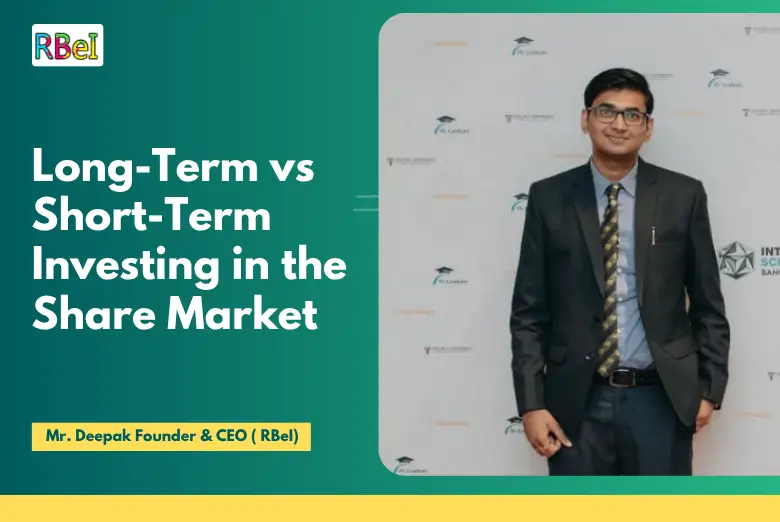
Investing in the share market involves many choices, but two of the most critical are Long-Term Investing and Short-Term Investing. Understanding long-term investing vs short-term investing from the outset can help both novice and advanced investors decide what strategy aligns with their financial goals. In this detailed blog post, you will learn what each investing horizon entails, key benefits and risks, important facts, strategies, and how to decide which is right for you. What is Short-Term Investing? Short-term investing in the share market refers to holding shares, stocks, or other equity instruments for a relatively brief period—ranging from a few days to a few months, sometimes up to a year. In short-term investing, the emphasis is on rapid gains rather than gradual growth. Because of that, investors engaging in short-term investing often respond to market trends, news events, technical indicators, and macroeconomic announcements. Moreover, they typically use tools such as swing trading, day trading, or momentum trading. Furthermore, short-term investing demands constant market monitoring, disciplined stop losses, and fast decision-making. However, the potential for higher returns comes with increased risk, increased transaction costs, and emotional pressure. What is Long-Term Investing? Long-term investing in the share market means buying shares or equity with a horizon of several years to decades. Commonly, long-term investors hold positions for 5, 10, 20 years or more. In long-term investing, the focus is on fundamentals: company earnings, revenue growth, business models, macro trends, management quality, and economic cycles. Moreover, long-term investing benefits from compounding returns, dividend reinvestment, and reducing the impact of short-term market fluctuations. Furthermore, long-term investing tends to incur fewer transaction costs and lower tax burdens in many jurisdictions when gains are held for longer periods. However, long-term investors must tolerate volatility, market downturns, and sometimes slow growth for periods before eventual rewards. Key Differences Between Short-Term Investing vs Long-Term Investing When comparing short-term investing vs long-term investing, several key differences emerge. Understanding these in depth helps you align strategy with your risk tolerance, time horizon, and financial goals. Below are primary distinctions: Aspect Short-Term Investing Long-Term Investing Time Horizon Days, weeks, months Years to decades Risk Level High volatility, higher risk of loss Moderate to lower risk over time (though not risk-free) Return Potential Can be large in short bursts, but also losses can be steep Generally steady growth, cumulating over time via compounding Effort & Monitoring Requires frequent monitoring, analysis of charts, news, technical indicators Requires occasional checking, focus on fundamentals, macro trends Transaction Costs & Taxes Many transactions; higher costs; short-term capital gains taxes (or equivalent) Fewer trades; potential tax benefits; dividend returns contribute Emotional Stress High — quick decisions, fear of missing out (FOMO), risk of panic selling Lower — more patience, less reactive to daily market noise Moreover, whereas short-term investing may respond to hype, earnings surprises, or news shocks, long-term investing tends to smooth over those events. Consequently, long-term investors can capitalize on economic cycles, structural growth sectors, and compounding of returns. Risk and Reward Factors Volatility For short-term investing, volatility is both friend and foe: it creates opportunity, but it also introduces uncertainty. For long-term investing, volatility can be mitigated over time as markets tend to recover from shocks—such as recessions, crashes, or geopolitical events. Return Patterns & Compounding In long-term investing, compounding works wonders. If you invest in a well-priced, growing company and hold for many years, dividends plus reinvestment plus share price appreciation can lead to exponential growth. On the other hand, short-term investing relies more on timing the market correctly, which is notoriously difficult. Therefore, long-term investing often results in more consistent performance for those who stay invested, compared to trying to catch every short-term swing. Liquidity and Opportunity Costs Short-term investing demands liquidity—you need to have cash ready to enter and exit positions quickly. That means opportunity cost: your money may be tied up in trades or waiting to be deployed. With long-term investing, although your money is committed for the long haul, you benefit from staying invested through market cycles, rather than attempting to time the market. Emotional and Behavioural Risks Short-term investing often triggers emotional decision-making: fear, greed, FOMO, panic, etc. Long-term investing requires patience, discipline, ability to resist reacting to every piece of market noise. Because of that, many investors underperform when trying short-term strategies because of poor behavioral discipline. Costs and Taxes Transaction costs: Every trade typically incurs brokerage, commissions, bid-ask spread, and sometimes platform fees. In short-term investing, since trades are frequent, these costs accumulate significantly. Taxes: Many tax regimes impose higher tax rates on short-term capital gains than long-term gains. Hence, long-term investing often offers better net returns after tax. Opportunity costs also include inflation, alternative investment returns, and the cost of not reinvesting dividends. Market Behaviour, Volatility, and Time Horizons Cycles and Mean Reversion Markets move in cycles: bull markets, bear markets, corrections, consolidations. Long-term investing allows an investor to ride several cycles; over years or decades, negative periods often reverse. However, in short-term investing, a single negative event can wipe out gains, especially if leverage is involved. Black Swan Events Events like financial crashes, pandemics, regulatory shocks, political instability—these are unpredictable. In short-term investing, such events create significant downside risk. Conversely, long-term investors may experience such events, but their impact is often diluted over time. Turnaround and recovery can help regain ground. Compound Growth vs Volatility Smoothing Because long-term investing involves being in the market over long durations, growth tends to smooth out. Meanwhile, short-term investing yields are more jagged; highs may be higher but lows can be painful. Strategies for Short-Term Investors If you lean toward short-term investing, following disciplined strategies is essential. Below are some useful approaches: However, no matter how good the strategy, short-term investing is highly competitive and often requires full-time attention and experience. Strategies for Long-Term Investors For those preferring long-term investing, here are strategies that tend to produce healthy returns over years: Long-term investing rests heavily upon patience, consistency, and a clear understanding of financial goals. Taxation, Costs,
Climate Change Influencing Gold’s Role in Central Bank Reserves
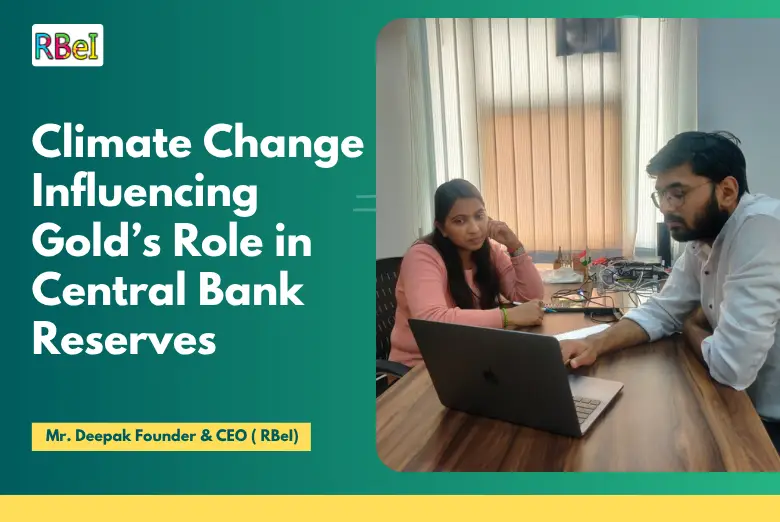
Moreover, climate change influencing gold’s role in central bank reserves is becoming a central topic for students, policymakers, and finance professionals alike. Furthermore, this phrase — Climate Change Influencing Gold’s Role in Central Bank Reserves — captures three overlapping shifts: first, the macroeconomic and geopolitical drivers that push central banks toward gold; second, the climate-related risks and sustainability concerns attached to gold as a physical commodity; and third, the institutional responses by central banks that now must reconcile reserve management with climate risk frameworks. Consequently, understanding this topic helps students link environmental science, monetary policy, and portfolio management in a practical, policy-relevant way. Why Gold Has Long Been Central to Reserves — and Why That’s Changing Firstly, gold has historically been valued by central banks for three core reasons: as a store of value, as a volatility hedge (especially versus currencies), and as a shock absorber in times of geopolitical or financial stress. Secondly, in recent years central banks significantly increased gold purchases, responding to geopolitical uncertainty, currency diversification needs, and concerns about fiat currency risks. For example, surveys and statistics from the World Gold Council and regional authorities show record central-bank buying in the early 2020s, with continued strong appetite through 2024–2025. However, while demand rose, another narrative emerged: gold is not only a financial asset but also a physical commodity whose production and supply chains have environmental footprints. Therefore, central bankers and analysts are increasingly asking whether gold in reserves creates exposure not only to market and liquidity risks but also to climate and ESG risks — both direct (environmental damage from mining) and indirect (reputational or transition risk as global policy and markets decarbonize). The Two Sides of the Coin — Gold as a Climate Hedge vs Gold’s Environmental Footprint Gold as a climate hedge and safe-haven (financial side) Moreover, climate change can increase macroeconomic volatility — for instance, through extreme weather disrupting supply chains, or through the geopolitical fallout from resource stresses — and therefore can increase demand for safe-haven assets. Consequently, gold’s historical role as a diversifier and crisis hedge can become more valuable to central banks seeking resilience in the face of climate-driven shocks. In short, climate change can strengthen the financial case for holding gold. Gold’s environmental footprint (physical side) Conversely, gold mining is carbon- and resource-intensive. Nearly all greenhouse-gas emissions related to gold arise from mining operations and, primarily, electricity generation for mining activities. Studies estimate global GHG emissions from gold mining in excess of 100 million tonnes CO₂-e per year, while lifecycle assessments highlight large variance in emissions intensity across mines and countries. Hence, gold is not immune to environmental scrutiny. Therefore, the physical realities of gold production — deforestation, water use, mercury pollution in artisanal operations, energy-intensive ore processing — create ESG and reputational risks. For central banks that now emphasize sustainability and the legal/regulatory dimensions of climate risk, holding a commodity tied to such impacts complicates the picture. How Central Banks Are Responding — Integrating Climate Risk into Reserves Management Firstly, central banks are not a monolith. Yet across many jurisdictions the trend is clear: financial authorities are moving to incorporate climate risk into their operational frameworks, guided by international studies and networks (for example NGFS), legal reviews (IMF work), and internal risk committees. Consequently, reserves management — long viewed as a technical, rule-driven function — is receiving new scrutiny for climate-related exposures. Moreover, the responses take several concrete forms: Climate risk assessment for reserve assets. Some central banks are exploring how to measure climate exposure across asset classes, including the unique characteristics of physical commodities like gold. Academic and policy work has proposed frameworks to treat gold as a separate asset class in climate-risk analysis. Sustainability and ethical sourcing criteria. While central banks rarely buy newly-mined retail jewellery, their purchases can drive attention to traceability, responsible sourcing, and environmental standards in the mining supply chain. Accordingly, central banks and official-sector buyers are beginning to ask suppliers and market intermediaries about provenance and environmental credentials. Portfolio policy adjustments. In some cases, central banks are expanding diversification not to remove gold but to balance its role with green bonds, foreign-exchange diversification, and other assets that may align better with climate objectives. This is partly driven by guidance and recommendations from international working groups on sustainable reserve management. Practical Issues — Liquidity, Valuation, and Climate Stress-Testing Gold Moreover, integrating climate risk into reserve management raises several technical questions that students and practitioners must wrestle with, including liquidity, valuation, and stress-testing. Liquidity and market functioning. Gold benefits from deep, liquid markets (London, COMEX, Shanghai). Consequently, central banks can usually buy or sell gold without the same friction as some green instruments. However, sudden surges in demand — for example, during geopolitical crises or climate-induced economic shocks — can spike prices and market stress. Valuation under transition scenarios. If policy responses to climate change (e.g., carbon pricing, shifts away from fossil fuels) alter the value of currencies, commodities, and sovereign risk premia, the relative attractiveness and real returns of gold could change. Thus, valuation models used by reserve managers are being updated to include climate transition scenarios. Stress-testing and scenario analysis. Central banks already use stress tests for financial risk; now they must layer climate scenarios on top. For gold this means considering not only market shocks but also long-term supply impacts (e.g., mine closures due to water shortages or carbon costs), which could affect supply dynamics and price volatility. Academic work suggests methods for integrating gold into climate-stress frameworks. Supply-Side Climate Vulnerabilities — How Climate Change Can Affect Gold Supply Firstly, climate change is not just about emissions — it is also about physical risks (droughts, floods, heat) that affect mining operations. For example: Water stress and mine operations. Many gold-mining operations depend heavily on water for processing ores. Consequently, prolonged droughts or competing water uses (agriculture, domestic supply) can constrain production or increase costs. Extreme weather events. Flooding and storms can damage infrastructure and delay production or transportation, introducing supply
Understanding SCR: Why Sustainability and Climate Risk Matter in Finance
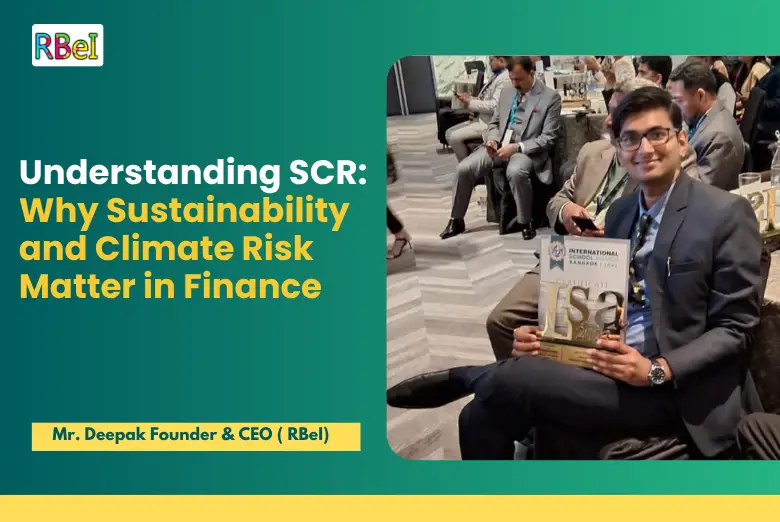
In today’s evolving finance world, Sustainability and Climate Risk (SCR) have emerged as central themes, not just buzzwords. As more institutions, regulators, investors, and stakeholders emphasize responsible investing, sustainability and climate risk matter more than ever in finance. SCR concerns the integration of environmental sustainability and climate change considerations into financial decision-making, risk management, and capital allocation. In this blog, we’ll deeply explore: what SCR means, why it matters, how it is applied in finance, challenges, emerging trends, and what students and future finance professionals should know. By weaving in Sustainability and Climate Risk (SCR) early and often, this blog strives to give you both conceptual clarity and practical insights. What Is SCR? (Sustainability and Climate Risk) Defining SCR: Sustainability and Climate Risk “Sustainability and Climate Risk (SCR)” refers broadly to the risks, opportunities, and management practices associated with climate change, environmental degradation, and sustainable development goals as they intersect with finance and economics. Sustainability typically refers to meeting present needs without compromising the ability of future generations to meet their own—covering environmental, social, and governance (ESG) considerations. Climate risk refers to the financial risks arising from climate change—both the physical risks (storms, floods, heat waves, sea-level rise) and transition risks (policy changes, technological disruption, shifts in consumer preferences). Combined, Sustainability and Climate Risk (SCR) deals with embedding climate and sustainability factors into financial analysis, risk management frameworks, capital allocation, regulation, reporting, and strategy. When we speak of “SCR in finance,” we mean how financial institutions, investors, corporations, and regulators factor in climate-related uncertainties and sustainable development into financial decisions. SCR vs ESG: How They Relate and Differ While SCR overlaps with ESG (Environmental, Social, Governance), it has a distinct focus: ESG is broader: it includes social and governance issues (labor practices, human rights, board diversity, etc.). The “E” in ESG covers environmental issues, including climate. SCR narrows more tightly on sustainability + climate dynamics—emphasizing climate risk, transition strategy, long-term resilience, nature risk, carbon accounting, etc. In other words, SCR is like a focused subdomain within ESG / sustainable finance, devoted specifically to climate risk and sustainability strategies. Institutions like GARP (Global Association of Risk Professionals) now offer a SCR Certificate to equip professionals with competencies in sustainability and climate risk. Thus, when you see SCR, think: “the intersection of sustainability and climate risk applied in finance.” Why Sustainability and Climate Risk Matter in Finance: Key Drivers To answer “why SCR matters in finance,” we must explore several forces pushing the integration of sustainability and climate risk into financial systems. Here are the major drivers: 1. Escalating Physical Climate Risks Extreme weather events (storms, floods, droughts, wildfires), sea-level rise, heat stress, shifting precipitation patterns—all pose physical risks to assets, supply chains, infrastructure, and ecosystems. In finance, physical risks can translate into: Asset damage (e.g. real estate, power plants, transportation infrastructure) Business disruption (supply chain delays, reduced productivity) Insurance losses, increased claims, liability exposure Credit risk deterioration (borrowers affected by climate shocks may default) Hence, financial institutions must evaluate how portfolios will fare under more frequent and severe climate events. A recent review on financial climate risk highlights how the complexity of integrating climate science into risk frameworks is a key challenge. 2. Transition Risks and Policy Shifts Transition risk arises from shifts in policies, regulation, technology, market preferences, and investor sentiment as economies decarbonize. Examples include: Carbon pricing or tax implementation Stricter emissions regulations Mandated phase-outs of fossil fuels Technological disruption (e.g. renewable energy, battery tech) Market revaluation of “stranded assets” (e.g. coal reserves, non-compliant infrastructure) Financial firms that fail to anticipate transition risk may face sudden asset revaluations or stranded investments. 3. Regulatory and Disclosure Pressure Globally, regulatory bodies are increasingly mandating climate-related financial disclosures. For instance: The Task Force on Climate-related Financial Disclosures (TCFD) laid out a framework centered on governance, strategy, risk management, metrics & targets. Many jurisdictions (e.g. EU, UK) are moving toward mandatory disclosures aligned with TCFD or similar frameworks. Supervisory authorities are pushing banks, insurers, asset managers to integrate climate risk into capital planning and stress testing. Thus, financial firms cannot ignore SCR—compliance demands it. 4. Investor and Stakeholder Demands Investors—especially institutional investors, sovereign wealth funds, pension funds—are demanding that capital be directed toward sustainable and resilient ventures. They are incorporating ESG screens, sustainable mandates, and climate-themed products (e.g. green bonds). Stakeholders such as clients, regulators, civil society, millennials, and employees expect organizations to have credible sustainability and climate risk strategies. 5. Opportunity and Innovation SCR is not just about risk mitigation. It opens doors to: Sustainable financial products (green bonds, sustainability-linked loans, climate derivatives) Investment in climate solutions—renewables, energy efficiency, carbon capture, climate adaptation infrastructure Competitive advantage: firms with better SCR frameworks can win capital, reputation, regulatory favor Resilience: better positioning in a low-carbon, climate-resilient future Thus, SCR matters as both a defensive necessity and a proactive growth lever. 6. Systemic Risk and Financial Stability Climate change is not just an idiosyncratic risk—it is systemic. Because climate impacts are correlated (affecting multiple sectors, geographies, assets), they can threaten broader financial stability. Financial regulators and central banks are increasingly treating climate risk as a macroprudential concern. Deloitte emphasizes that sustainable finance and integration of climate risk must become engrained in day-to-day operations across financial services. Key Dimensions of SCR in Finance Understanding SCR in finance requires decomposing the subject into manageable dimensions. Below are essential building blocks. Physical Risk, Transition Risk & Liability Risk Physical Risk: Risks from climate hazards (floods, storms, drought). These risks may damage property, infrastructure, operations. Transition Risk: Risks from the shift to a low-carbon economy—policy, technology, market, legal shifts. Liability Risk: Potential for legal claims—companies may be held accountable for contributing to climate change, or for failing to mitigate risks. These three are core categories of climate risk in financial analysis. Scenario Analysis & Stress Testing To manage SCR, institutions use scenario analysis—projecting various climate futures (e.g. 1.5 °C, 2 °C, 3 °C warming) and assessing impacts on portfolios. Stress testing can simulate severe climate shocks, transition pressures,
How the GARP SCR Certificate Can Boost Your ESG and Risk Career
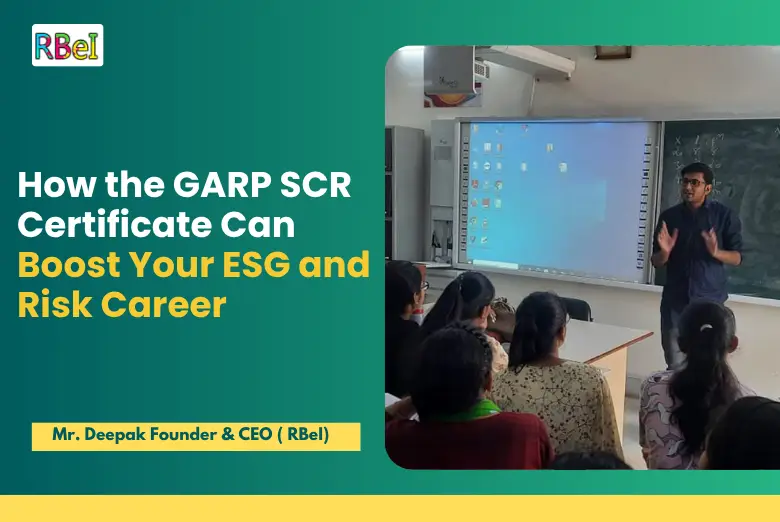
In today’s rapidly evolving financial landscape, professionals are increasingly expected to understand and manage sustainability and climate-related risks. The GARP SCR Certificate (Sustainability and Climate Risk) is a globally recognized credential that equips individuals with the knowledge and skills necessary to assess and mitigate these risks effectively. This certification is particularly valuable for those pursuing careers in ESG (Environmental, Social, and Governance) and risk management, as it demonstrates a commitment to sustainable practices and enhances professional credibility. Understanding the GARP SCR Certificate What is the GARP SCR Certificate? The GARP SCR Certificate gives professionals a comprehensive understanding of sustainability and climate risks and shows how these factors affect financial markets and institutions. Offered by the Global Association of Risk Professionals (GARP), this certification covers a range of topics, including climate science, risk assessment methodologies, and sustainable finance practices. Exam Structure and Content The SCR exam includes 80 multiple-choice questions and one case study, to be completed within four hours. It covers several key areas: The organization offers the exam twice a year—in April/May and October/November—and reserves appointments on a first-come, first-served basis. Benefits of the GARP SCR Certificate 1. Enhances Career Opportunities Holding the GARP SCR Certificate can significantly enhance your career prospects in the ESG and risk management sectors. It demonstrates a specialized understanding of sustainability and climate risks, making you a valuable asset to employers seeking professionals with expertise in these areas. 2. Provides a Competitive Edge In a competitive job market, possessing the SCR certification sets you apart from other candidates. It showcases your commitment to professional development and your ability to address complex challenges related to sustainability and climate risk. 3. Facilitates Career Transitions For professionals looking to transition into ESG or risk management roles, the GARP SCR Certificate serves as a credible credential that validates your knowledge and skills in these fields. It can open doors to new career paths and opportunities. 4. Expands Professional Network Becoming a GARP SCR certificate holder connects you with a global community of risk professionals and experts in the field. This network provides opportunities for collaboration, knowledge sharing, and career networking. Preparing for the GARP SCR Exam Study Materials and Resources To prepare effectively for the SCR exam, it’s essential to utilize comprehensive study materials and resources. GARP provides an official study guide and learning objectives that help candidates self-study for the exam. Additionally, the official SCR exam book includes 10 chapters with associated learning objectives and illustrative case studies. Study Plan and Strategies Developing a structured study plan is crucial for success in the SCR exam. Allocate sufficient time to cover all exam topics, focusing on areas where you may need additional review. Practice with sample questions and case studies to familiarize yourself with the exam format and improve your problem-solving skills. Exam Registration and Logistics To register for the SCR exam, visit the official GARP website and select your preferred exam date and location. Appointments are reserved on a first-come, first-served basis, so it’s advisable to register early. Career Paths with the GARP SCR Certificate Earning the GARP SCR Certificate can open doors to various career paths in the ESG and risk management sectors. Some potential roles include: These roles are in high demand across various industries, including banking, asset management, insurance, consulting, technology, and even non-financial sectors like fashion and hospitality. Conclusion The GARP SCR Certificate is a valuable credential for professionals seeking to enhance their careers in ESG and risk management. It provides a comprehensive understanding of sustainability and climate risks, equipping individuals with the knowledge and skills necessary to address these challenges effectively. By earning this certification, you demonstrate a commitment to sustainable practices and position yourself as a leader in the field of risk management.
Best FRM Coaching in India – My Journey with RBei Classes

When I look back at my FRM journey, I can confidently say that choosing RBei Classes was the best decision of my career. I had the dream to become a risk management professional, but like most working professionals, I was worried about balancing work, study, and preparation for such a globally recognized certification. However, with the FRM online course at RBei Classes, everything changed. The best FRM lectures, expert guidance from Deepak Goyal Sir, unlimited watch views, one-to-one mentorship, and free access to Python, SQL, Machine Learning, and Data Science courses gave me the foundation I needed. Right from the start, I realized why so many students call RBei Classes the FRM best coaching in India. The institute is not just about teaching; it is about handholding, motivating, and preparing you until you succeed. In fact, their policy of “course valid till you pass” reflects their dedication. Moreover, the institute also supports placement, which ultimately helped me land my dream job at Kotak Bank in Delhi as a Compliance Officer. My Background and Ambition My name is Rudra Saini, and in 2025, I successfully cleared FRM Part 1 in May, FRM Part 2 in August, and the SCR exam in April. Passing these exams in a short span while working was not easy. Yet, with the structured FRM course duration and proper mentorship, it became achievable. I enrolled in the Platinum Package for FRM Part 1 and Part 2, as well as the SCR Platinum Package from RBei Classes. These comprehensive packages came with the promise of unlimited views and personal mentoring, which was the exact support I needed as a working professional. Why I Chose RBei Classes – The Best FRM Coaching in India There are many institutes claiming to offer the best FRM coaching in India, but I had done my research before enrolling. What made me finalize RBei Classes were the following factors: One-to-One Guidance from Deepak Goyal Sir – He personally mentors students and clears even the smallest doubts. Unlimited Watch Views – As a working professional, my schedule was unpredictable. Unlimited access allowed me to learn at my own pace. FRM Online Course Accessibility – I didn’t need to travel or attend physical classes; everything was available online with top-quality lectures. Free Additional Courses – Python, SQL, Machine Learning, and Data Science were included for free, making me future-ready. Highest Pass Rate of 94% – With such proven results, I was confident about my chances. Placement Assistance – Unlike other institutes, RBei Classes also supports students in finding relevant job opportunities after FRM. When I weighed these factors, it was clear that RBei Classes was not only the best FRM coaching in India but also the most reliable choice for professionals like me. My Preparation Strategy for FRM When I started my FRM journey, I knew I had to follow a structured strategy because clearing both parts in one year is a challenge. Let me share the exact approach that worked for me. 1. Understanding the FRM Syllabus The FRM syllabus is vast and covers topics like Risk Management, Quantitative Analysis, Financial Markets, Credit Risk, Market Risk, and Operational Risk. The lectures from RBei Classes broke down each concept into simple, easy-to-understand modules. This clarity was essential because without strong fundamentals, it is impossible to score well. 2. Planning the FRM Course Duration The FRM course duration depends on individual pace, but ideally, 4–6 months of preparation for each part is sufficient if you study consistently. Since I was a working professional, I planned for 2 hours of study daily on weekdays and longer sessions on weekends. Unlimited access to lectures allowed me to re-watch difficult topics until I mastered them. 3. Following Best FRM Lectures Deepak Sir’s best FRM lectures were not just about explaining theory. He connected every topic with real-world risk management examples, which made learning engaging. I used these lectures as the foundation and then solved practice questions after each module. 4. Mock Tests and Revision RBei Classes provided plenty of mock tests and practice questions. These mock exams were designed in the same format as the actual exam, which helped me build exam confidence. Additionally, I revised each subject multiple times, which reinforced my learning. 5. Balancing Work and Studies As a working professional, my biggest challenge was time. However, RBei’s flexibility and unlimited access helped me create a balance. I would watch lectures during commutes, revise concepts late at night, and use weekends for mock tests. This balance was key to my success. My FRM Success Story By following this strategy and with constant mentorship, I cleared FRM Part 1 in May 2025 and FRM Part 2 in August 2025. Clearing the SCR Exam in April 2025 further added value to my resume. Immediately after, I received a job opportunity from Kotak Bank in Delhi as a Compliance Officer. This achievement was not just about clearing exams—it was about career transformation. Without RBei Classes, this would have been almost impossible. Why RBei Classes is the Best for Working Professionals If you are a working professional like me, then trust me, RBei Classes is the best FRM coaching in India. The reason is simple: they understand your struggles and provide solutions. Unlimited watch views, flexible FRM online courses, and personal guidance make the journey manageable. Additionally, their pass rate of 94% is a clear reflection of their effectiveness. Other institutes may give you study material, but RBei Classes gives you mentorship, motivation, and career guidance. That’s the difference. FRM Career Opportunities After Completing the Course Many aspirants often ask whether the FRM syllabus and effort are worth it. Let me assure you, they absolutely are. After FRM, you open doors to multiple FRM career opportunities, such as: Risk Analyst Compliance Officer Market Risk Manager Credit Risk Analyst Operational Risk Specialist Investment Risk Consultant Treasury Manager I personally secured a role in Kotak Bank as a Compliance Officer. However, I know many peers who went into investment banking, consulting, and
Best FRM Coaching in India with Highest Pass Rate – My Journey with RBei Classes
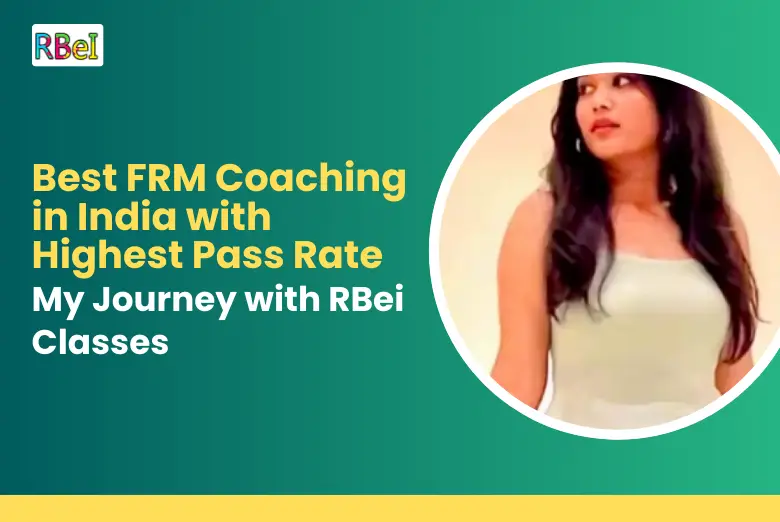
When I started my FRM journey, I was not very confident about clearing the exam, especially because I had already failed in my attempt to clear CA. However, life gave me a second chance, and I can confidently say today that the best FRM coaching in India is offered by RBei Classes under the expert guidance of Deepak Sir. From one-to-one mentoring sessions to unlimited watch views and a course validity till you pass, RBei Classes shaped my journey from an unsure student working full-time in a small audit firm to a successful FRM professional who got placed in PwC Mumbai. In this blog, I will share my FRM success story—how I managed to clear both parts of FRM in just six months while handling a full-time job, how RBei Classes supported me throughout with their FRM online course, and why I believe they truly provide the best FRM lectures in India. Along the way, I will also share insights on FRM course duration, the FRM syllabus, and how to build a solid study strategy as a working professional. How I Discovered the Best FRM Coaching in India To be honest, after struggling with CA exams, I was searching for a professional certification that could enhance my career in finance and risk management. I came across the FRM course (Financial Risk Manager) and realized its global recognition and high demand in the financial industry. However, I knew that I needed strong mentorship and structured guidance because I had a weakness in quantitative topics. That’s when I found RBei Classes, which is widely recognized for having the highest FRM pass rate in India—94%. Their FRM online course instantly stood out to me because: It offered one-to-one guidance from Deepak Sir, which is rare to find. They provided unlimited watch views so I could revise concepts as many times as I needed. The course validity lasted until you pass, which gave me confidence and reduced my stress. Along with the FRM course, they offered free courses in Python, SQL, Machine Learning, and Data Science, which are highly relevant for modern finance careers. Most importantly, their placement support was strong, and I personally experienced its benefits after completing FRM. It was clear to me that RBei Classes provided the best FRM lectures in India, and I immediately enrolled in their Platinum Package for both parts. My FRM Course Duration and Timeline I began my FRM preparation in February 2025 while working full-time in a small audit firm. My target was clear—I wanted to complete both parts of the FRM course within the same year. Thanks to RBei Classes’ structured plan, I was able to do exactly that. Here’s how my timeline looked: February 2025 – Started my preparation with Part 1. May 2025 – Cleared FRM Part 1 in my first attempt. August 2025 – Cleared FRM Part 2 successfully. September 2025 – Got a placement opportunity from PwC Mumbai. This shows that the FRM course duration can be as short as six months if you have the right guidance and consistent study routine. My Daily Study Strategy for FRM Balancing a full-time job and FRM preparation was not easy, but with the right coaching, I was able to manage both. I followed a disciplined strategy: 4 Hours of Daily Study – I studied for 2 hours in the morning before work and 2 hours in the evening after work. Quantitative Practice – Since I was weak in quants, I revised those lectures multiple times using RBei’s unlimited watch feature. Mock Tests – RBei provided excellent mock papers, and solving them boosted my confidence. One-to-One Guidance – Whenever I got stuck, Deepak Sir’s personal mentoring sessions helped me clear my doubts quickly. Revision Strategy – Before the exams, I did two full revisions of the entire FRM syllabus, ensuring I was exam-ready. Without RBei Classes and Deepak Sir, this level of preparation would have been impossible. Why RBei Classes Has the Best FRM Lectures The biggest reason I cleared both FRM parts so quickly is the quality of lectures at RBei Classes. The lectures are structured, easy to follow, and exam-focused. Some key highlights include: Comprehensive FRM Syllabus Coverage – Every topic from Quant, Risk Management, Valuation, Market Risk, and Credit Risk was explained clearly. Practical Examples – The lectures used real-world scenarios, which made learning more interesting. Flexibility – The ability to revisit difficult topics multiple times gave me an edge. Exam-Oriented Focus – Instead of wasting time on unnecessary theory, the lectures were designed to maximize exam success. If you are looking for the best FRM lectures, I can confidently say that RBei Classes is the right choice. Understanding the FRM Syllabus For anyone starting their journey, it is important to understand the FRM syllabus structure. It is divided into two parts: FRM Part 1 – Focuses on foundations like Quantitative Analysis, Financial Markets, Products & Valuation, and Risk Models. FRM Part 2 – Deals with advanced concepts like Market Risk, Credit Risk, Operational Risk, Risk Management, and Current Issues in Financial Markets. The FRM syllabus is challenging, but with a proper study plan and the right coaching, it is very much manageable. FRM Career Opportunities After Completion One of the most motivating factors during my preparation was the wide range of FRM career opportunities available. After clearing both parts, I immediately received a job offer from PwC Mumbai. FRM professionals are in high demand in banks, consulting firms, investment companies, and global financial institutions. Some top roles include: Risk Analyst Market Risk Manager Credit Risk Specialist Financial Consultant Investment Risk Advisor The FRM designation holds global respect, and RBei Classes helped me achieve it in record time. Why RBei Classes is the Best FRM Coaching in India for Working Professionals For working professionals like me, balancing job and studies is the hardest part. This is exactly why RBei Classes is the best FRM coaching in India. Their course design is highly flexible, student-friendly, and result-oriented. Most importantly, their 94%
FRM Best Coaching in India – My Journey with RBei Classes and Deepak Goyal Sir

When it comes to preparing for a global certification like the Financial Risk Manager (FRM), the right guidance can make or break your success. My name is Divya Sharma, and I recently cracked FRM Part 2 in just 60 days. Although it was not easy, with dedication and the right mentorship, I made it possible. I studied approximately 7–8 hours daily and focused deeply on my weaker areas, especially Credit Risk. The most amazing part of this journey is that after passing my FRM Exam, I received a job opportunity from HDFC Bank in Chennai as a Risk Analyst. Without doubt, I owe this success to Deepak Goyal Sir and the structured coaching I received from RBei Classes – truly the FRM best coaching in India. In this blog, I will share: My FRM preparation strategy for Part 2 Why I consider RBei Classes the best FRM coaching in India An overview of the FRM syllabus Details about FRM course duration Insights into FRM online course advantages Why the best FRM lectures matter so much My experience with career opportunities after FRM If you are a working professional or a student aspiring to build a career in risk management, this blog will guide you step by step. Why RBei Classes is the FRM Best Coaching in India When I enrolled for the FRM online course with RBei Classes, I did not expect the level of support and flexibility they would provide. However, as I progressed, I realized why they have such a high pass rate of 94%, especially among working professionals. Here is what makes them the best FRM coaching in India: One-to-one mentorship with Deepak Sir: Every doubt was addressed personally, which gave me clarity. Unlimited watch views: I could revisit the lectures whenever I needed revision. Course valid till you pass: There was no fear of losing access even if I took longer. Free technical add-ons: Python, SQL, Machine Learning, and Data Science were included at no extra cost. Placement support: Beyond exams, RBei Classes helped me secure a career opportunity with HDFC Bank. This combination of academic strength and career support truly makes them stand out as the best FRM coaching in India. Understanding the FRM Syllabus The FRM syllabus is broad, detailed, and application-driven. It is divided into two parts. FRM Part 1 Syllabus Foundations of Risk Management Quantitative Analysis Financial Markets and Products Valuation and Risk Models FRM Part 2 Syllabus Market Risk Measurement and Management Credit Risk Measurement and Management Operational Risk and Resiliency Liquidity and Treasury Risk Measurement Risk Management and Investment Management Current Issues in Financial Markets For me, Credit Risk was initially the toughest part of the FRM syllabus. However, with best FRM lectures from Deepak Sir, I not only gained confidence but also scored in the top quartile in Credit Risk. FRM Course Duration – How Long Does It Take? The FRM course duration depends on your pace and availability. On average: FRM Part 1 requires about 4–6 months of preparation. FRM Part 2 usually takes 6–9 months. However, with dedication and the right FRM online course, I managed to complete FRM Part 2 in just 60 days. Though challenging, it is possible if you plan strategically, study consistently, and rely on the best FRM coaching in India. Why Choose an FRM Online Course Today, flexibility is essential, especially for working professionals. Choosing an FRM online course allows you to: Study at your own pace Revisit lectures multiple times with unlimited watch access Balance professional life with exam preparation Access bonus technical courses (Python, SQL, ML, Data Science) Learn from top mentors like Deepak Goyal Sir without location barriers For me, the FRM online course from RBei Classes was the perfect solution since I could manage both my study time and career opportunities. Best FRM Lectures – A Game Changer The best FRM lectures are those that simplify complex topics, provide real-world applications, and are exam-oriented. That is exactly what I experienced at RBei Classes. Credit Risk: Made simple with practical case studies. Market Risk: Explained using global events and models. Operational Risk: Connected with real banking practices. Current Issues: Focused on emerging risks in financial markets. Deepak Sir’s way of teaching turned difficult concepts into manageable learning blocks. I believe this is why RBei Classes is trusted as the provider of the best FRM lectures in India. My FRM Part 2 Preparation Strategy Here’s the step-by-step strategy I followed to clear FRM Part 2 in 60 days: Week 1–2: Foundation Building Revised key Part 1 concepts. Focused on Market Risk and Credit Risk. Made concise notes for every chapter. 3–4: Intensive Study Watched recorded best FRM lectures daily. Solved end-of-chapter questions. Dedicated extra time to Credit Risk. Week 5–6: Mock Tests and Revision Attempted 5 full-length mocks. Analyzed mistakes and revised weak areas. Attended doubt sessions with Deepak Sir. This structured preparation ensured I was ready, confident, and efficient by exam day. FRM Career Opportunities After Passing The FRM designation opens doors across banking, consulting, fintech, and global markets. Here are some common FRM career opportunities: Risk Analyst / Risk Manager Credit Risk Specialist Market Risk Consultant Operational Risk Manager Treasury and Liquidity Risk Expert Investment Risk Strategist Roles in global banks like HSBC, HDFC, Citi, and JP Morgan Personally, after clearing my FRM exam, I was offered a Risk Analyst role at HDFC Bank in Chennai. This proves how powerful the FRM credential is in shaping careers. Why RBei Classes Has the Highest Pass Rate of 94% Among all FRM institutes in India, RBei Classes stands out with a 94% pass rate. This is possible because of: Expert guidance by Deepak Goyal Sir Structured FRM online course Practical teaching methodology Personal mentorship and doubt-solving Comprehensive placement assistance For working professionals like me, this made the difference between just attempting FRM and actually succeeding. Conclusion – Best FRM Coaching in India for Working Professionals Looking back at my journey, I can confidently say that RBei Classes is the
FRM Best Coaching in India – My Journey with RBei Classes and Deepak Goyal Sir

When I look back at my FRM journey, one thing is clear: choosing the FRM best coaching in India made all the difference. My name is Komal Adhikari, and I successfully cracked FRM Part 1 in May 2025 in just 30 days. It may sound unbelievable, but with the best FRM lectures, personalized guidance, and the right study plan, it was possible. In this blog, I will share my FRM preparation strategy, my experience with RBei Classes, how Deepak Goyal Sir mentored me, and why I believe they offer the best FRM coaching in India. Along the way, I will also explain the FRM syllabus, FRM course duration, career opportunities after FRM, and why an FRM online course is the smartest investment for finance professionals. How I Cracked FRM Part 1 in 30 Days When I registered for FRM Part 1 May 2025 attempt, I knew the exam was challenging. Everyone told me that the FRM syllabus was vast and required months of preparation. However, due to work commitments and personal reasons, I had just 30 days left before the exam. Instead of panicking, I trusted the FRM Part 1 Platinum Course by RBei Classes. With unlimited watch views, one-to-one guidance, and well-structured lectures, I built my strategy: Daily study hours: I dedicated 12–14 hours every single day. Topic prioritization: I focused more on Quantitative Analysis, Risk Management Basics, and Financial Markets since these carry heavy weightage. Best FRM lectures: I revised with recorded videos multiple times thanks to unlimited watch access. Mentorship: Whenever I was stuck, Deepak Goyal Sir personally guided me and cleared my doubts. Mock tests: I attempted practice questions daily, analyzing weak areas and revisiting them. Finally, the gamble paid off. In May 2025, I cleared FRM Part 1 on my first attempt, and within weeks, I received a job offer as a Risk Manager at HSBC Mumbai. Why I Chose RBei Classes – The Best FRM Coaching in India When I was searching for an FRM online course, I wanted three things: flexibility, expert guidance, and career support. RBei Classes provided all three and much more: One-to-one mentorship: Unlike many institutes, here I had personal sessions with Deepak Sir, which helped me stay on track. Unlimited watch views: I could watch any lecture as many times as needed. For me, revision was the key. Valid till you pass: The course access never expires until you clear FRM, which removes stress about deadlines. Bonus courses: Along with the FRM Platinum Course, I received free training in Python, SQL, Machine Learning, and Data Science—skills that finance employers value today. Placement assistance: RBei Classes not only prepared me for exams but also guided me in landing a career opportunity with HSBC. This holistic approach makes me confident that RBei Classes is truly the best coaching institute in India for FRM aspirants. Understanding the FRM Syllabus Many students underestimate the FRM syllabus, but it is essential to plan well. The syllabus is updated by GARP annually, and it is divided into two parts. FRM Part 1 Syllabus Foundations of Risk Management Quantitative Analysis Financial Markets and Products Valuation and Risk Models FRM Part 2 Syllabus Market Risk Measurement Credit Risk Measurement Operational and Integrated Risk Management Risk Management and Investment Management Current Issues in Financial Markets The structured way in which RBei Classes covers the FRM syllabus ensures that nothing is left out, even if you are short on time like I was. FRM Course Duration – How Much Time Do You Need? The FRM course duration depends on your preparation strategy. On average: FRM Part 1: Students take 4–6 months of consistent study. FRM Part 2: Usually takes 6–9 months. However, in my case, with the right guidance and focused effort, I managed to complete FRM Part 1 in just 30 days. This is not typical, but it proves that with best FRM lectures and the right online course, accelerated learning is possible. Why FRM Online Course is the Right Choice Today, working professionals and students want flexibility. A classroom-based program may not always fit into their schedules. That’s why an FRM online course is ideal. With RBei Classes’ online FRM coaching: I could study at my own pace. I revised difficult topics multiple times. I saved time and energy commuting. I had access to extra courses like Python and SQL, which boosted my employability. Thus, an FRM online course is not just convenient but also more effective when structured properly. Best FRM Lectures – My Experience I cannot emphasize enough how best FRM lectures by Deepak Sir made complex topics simple. His teaching style is practical, example-based, and exam-focused. For instance: In Quantitative Analysis, he explained difficult probability models in a way that even non-maths students can grasp. In Risk Models, he used real-world case studies to show how theory is applied in financial institutions. Every lecture ended with a recap and practice questions, ensuring concepts were solid. This clarity and exam orientation make them truly the best FRM lectures in India. Career Opportunities After FRM Clearing FRM opens doors globally. The FRM career opportunities are diverse, and roles are in high demand. After clearing my FRM Part 1, I received a placement at HSBC Mumbai as Risk Manager, but here are other common roles: Risk Analyst Market Risk Manager Credit Risk Specialist Operational Risk Consultant Investment Risk Strategist Quantitative Analyst Because FRM is recognized worldwide, the career scope extends beyond India to global financial hubs like London, New York, and Singapore. My FRM Preparation Strategy – A Detailed Breakdown Here’s the exact strategy I followed in my 30-day preparation window: Week 1 – Syllabus Familiarization & Basics Watched all introductory lectures. Focused on Quantitative Analysis (since it forms the base). Made short notes daily. Week 2 – Intensive Concept Building Watched lectures on Financial Markets & Products. Practiced numerical questions daily. Attended one-to-one mentorship sessions with Deepak Sir. Week 3 – Risk Models & Revision Dedicated 12 hours daily just for Risk Models. Revised Quantitative
